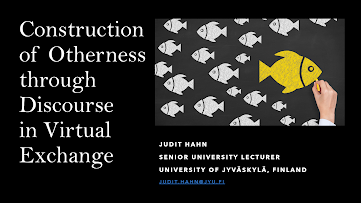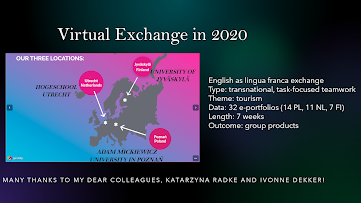Re-imagining Virtual Exchange
I held a presentation on the "Construction of Otherness through Discourse in Virtual Exchange" at the Eighth International Conference on the Development and Assessment of Intercultural Competence (ICC) Decentering Mobility in Intercultural Education: Engagement, Equity, and Access, January 27-30, 2022.
My study drew on 32 e-portfolios collected from a Virtual Exchange project, which was organized for the students of three universities – Poland, Finland, and the Netherlands – in 2020. The participants worked in small international teams on the theme of tourism, creating promotional materials such as videos and online magazines about their towns and universities. The e-portfolios served as learning diaries, in which the students were reporting on their VE experiences, with a special focus on group collaboration and problem-solving.
I used the method of Critical Discourse Analysis (CDA) to find answers to the following research questions: 1) To what extent do the e-portfolios provide evidence of othering through discourse?, 2) What discursive representations of otherness can be identified in the e-portfolios? Fairclough’s (2001) three-dimensional CDA framework was applied to study the microlevel of linguistic choices, the mesolevel of discursive practices, and the macrolevel of the broader social context and underlying ideologies. The results indicate dichotomies of difference constructed between one’s national group and the students from other countries (the foreign Other), along with perceived differences in space (the virtual Other), English language skills (the English-fluent Other), and gender (the female Other).
Based on the findings, I suggested re-imaging Virtual Exchange to reduce the impact of the pedagogy-imposed banal nationalism, skills-based pragmaticism, and deficit-centredness. I also pointed out how Virtual Exchange may (re)construct prejudices and essentialist thinking and made suggestions on how to adjust or modify the pedagogical design.
References
Fairclough, N. (2001). Language and power (2nd ed.). Harlow: Longman.




Comments
Post a Comment